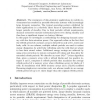Free Online Productivity Tools
i2Speak
i2Symbol
i2OCR
iTex2Img
iWeb2Print
iWeb2Shot
i2Type
iPdf2Split
iPdf2Merge
i2Bopomofo
i2Arabic
i2Style
i2Image
i2PDF
iLatex2Rtf
Sci2ools
102
click to vote
PATMOS
2000
Springer
2000
Springer
Dynamic Memory Design for Low Data-Retention Power
Abstract. The emergence of data-intensive applications in mobile environments has resulted in portable electronic systems with increasingly large dynamic memories. The typical operating pattern exhibited by these applications is a relatively short burst of operations followed by longer periods of standby. Due to their periodic refresh requirements, dynamic memories consume substantial power even during standby and thus have a significant impact on battery lifetime. In this paper we investigate a methodology for designing dynamic memory with low data-retention power. Our approach relies on the fact that the refresh period of a memory array is dictated by only a few, worst-case leaky cells. In our scheme, multiple refresh periods are used to reduce energy dissipation by selectively refreshing only the cells that are about to lose their stored values. Additional energy savings are achieved by using error-correction to restore corrupted cell values and thus allow for extended refresh perio...
Related Content
| Added | 25 Aug 2010 |
| Updated | 25 Aug 2010 |
| Type | Conference |
| Year | 2000 |
| Where | PATMOS |
| Authors | Joohee Kim, Marios C. Papaefthymiou |
Comments (0)

